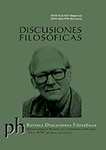Authors
Abstract
When constructing a theory of meaning for a natural language, a dilemma arises. If the theory is extensional, it will not be interpretative. If it is intensional, the theory will beg the question. In this article, we argue that Davidson's extensional theory of meaning escapes this dilemma. First, we present what is that theory. Then, we show the different criticisms that the theory has received, according to which this theory is not interpretative. Finally, we argue that such criticisms are insuffi cient and, moreover, that all intensional theory necessarily commits methodological errors.
References
Davidson, Donald. “Interpretación radical”. La búsqueda del significado. Valdés, L. M. (ed.). Madrid: Tecnos, 2005. Print.
Davidson, Donald. “Reply to Foster”. Inquiries into Truth and Interpretation. Oxford: Oxford University Press, 1984. Print.
Davidson, Donald. Inquiries into Truth and Interpretation. Oxford: Oxford University Press, 1984. Print.
Foster, John. “Meaning and truth-theory”. Truth and meaning: Essays in semantics. G. Evans & J. McDowell, J. (Eds.), 1976. Print.
Kölbel, Max. “Two Dogmas of Davidsonian Semantics”. Journal of Philosophy, 98(12), 2001: 613–635. Print.
Larson, Richard & Segal, Gabriel. Knowledge of Meaning. Cambridge, MA: MIT Press, 1995. Print
Segal, Gabriel. “Verdad y significado”. Ideas y valores, 125, 2004: 7-37. Print.
Speaks, Jeff. g“Truth Theories, Translation Manuals, and Theories of Meaning”. Linguistics & Philosophy 29(4), 2006: 487–505. Print.
Soames, Scott. “Truth, Meaning, and Understanding”. Philosophical Studies, 65, 1992: 17–35. Print
Tarski, Alfred. “La concepción semántica de la verdad”. La búsqueda del significado. Valdés, L. M. (ed.). Madrid: Tecnos, 2005. Print.

 pdf (Español (España))
pdf (Español (España))
 FLIP
FLIP




























